必修三Unit 1 Festivals around the world Period 2 Learning about language Important language points
- 格式:doc
- 大小:163.50 KB
- 文档页数:9
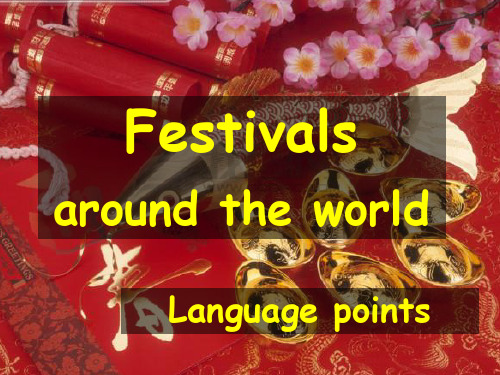
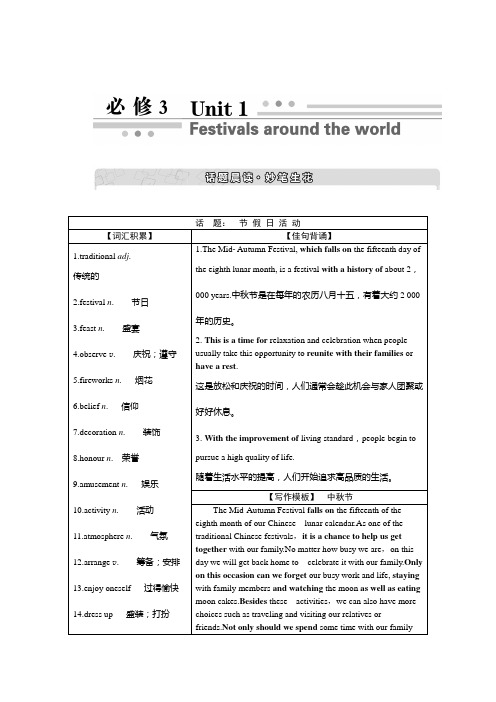
话题:节假日活动【词汇积累】【佳句背诵】1.traditional adj.传统的2.festival n. 节日3.feast n. 盛宴4.observe v. 庆祝;遵守5.fireworks n. 烟花6.belief n. 信仰7.decoration n. 装饰8.honour n. 荣誉9.amusement n. 娱乐10.activity n. 活动11.atmosphere n. 气氛12.arrange v. 筹备;安排13.enjoy oneself 过得愉快14.dress up 盛装;打扮1.The MidAutumn Festival, which falls on the fifteenth day of the eighth lunar month, is a festival with a history of about 2,000 years.中秋节是在每年的农历八月十五,有着大约2 000年的历史。
2. This is a time for relaxation and celebration when people usually take this opportunity to reunite with their families or have a rest.这是放松和庆祝的时间,人们通常会趁此机会与家人团聚或好好休息。
3. With the improvement of living standard,people begin to pursue a high quality of life.随着生活水平的提高,人们开始追求高品质的生活。
【写作模板】中秋节The Mid-Autumn Festival falls on the fifteenth of the eighth month of our Chinese lunar calendar.As one of the traditional Chinese festivals,it is a chance to help us get together with our family.No matter how busy we are,on this day we will get back home to celebrate it with our family.Only on this occasion can we forget our busy work and life, staying with family members and watching the moon as well as eating moon cakes.Besides these activities,we can also have more choices such as traveling and visiting our relatives or friends.Not only should we spend some time with our family15.get together 聚会;联欢16.have a wonderful time 过得愉快17.family reunion 家庭团聚18.in memory of /in honour of为了纪念during festivals but it is these festivals that remind us to havemore time with our family.,[学生用书P72~P74])Ⅰ.单词拼写根据音标及词义写出英文单词。
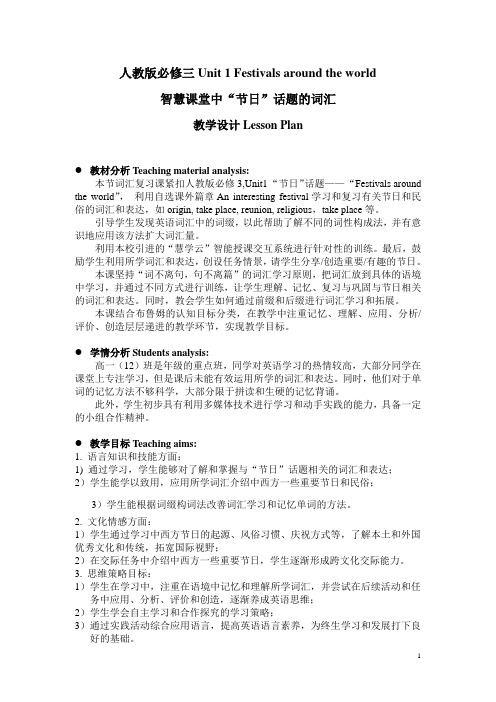
人教版必修三Unit 1 Festivals around the world智慧课堂中“节日”话题的词汇教学设计Lesson Plan●教材分析Teaching material analysis:本节词汇复习课紧扣人教版必修3,Unit1 “节日”话题——“Festivals around the world”,利用自选课外篇章An interesting festival学习和复习有关节日和民俗的词汇和表达,如origin, take place, reunion, religious,take place等。
引导学生发现英语词汇中的词缀,以此帮助了解不同的词性构成法,并有意识地应用该方法扩大词汇量。
利用本校引进的“慧学云”智能授课交互系统进行针对性的训练。
最后,鼓励学生利用所学词汇和表达,创设任务情景,请学生分享/创造重要/有趣的节日。
本课坚持“词不离句,句不离篇”的词汇学习原则,把词汇放到具体的语境中学习,并通过不同方式进行训练,让学生理解、记忆、复习与巩固与节日相关的词汇和表达。
同时,教会学生如何通过前缀和后缀进行词汇学习和拓展。
本课结合布鲁姆的认知目标分类,在教学中注重记忆、理解、应用、分析/评价、创造层层递进的教学环节,实现教学目标。
●学情分析Students analysis:高一(12)班是年级的重点班,同学对英语学习的热情较高,大部分同学在课堂上专注学习,但是课后未能有效运用所学的词汇和表达。
同时,他们对于单词的记忆方法不够科学,大部分限于拼读和生硬的记忆背诵。
此外,学生初步具有利用多媒体技术进行学习和动手实践的能力,具备一定的小组合作精神。
●教学目标Teaching aims:1. 语言知识和技能方面:1) 通过学习,学生能够对了解和掌握与“节日”话题相关的词汇和表达;2)学生能学以致用,应用所学词汇介绍中西方一些重要节日和民俗;3)学生能根据词缀构词法改善词汇学习和记忆单词的方法。
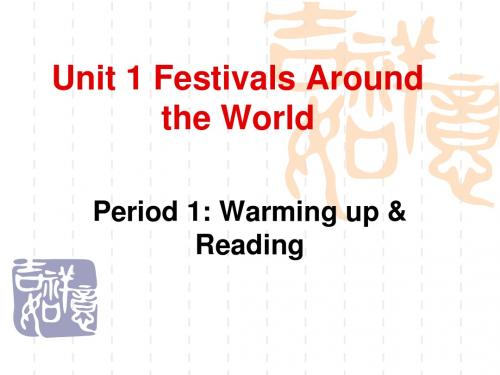
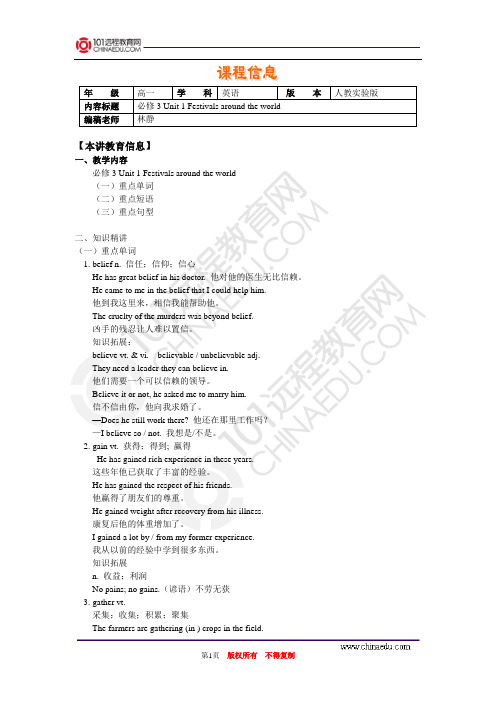
【本讲教育信息】一、教学内容必修3 Unit 1 Festivals around the world(一)重点单词(二)重点短语(三)重点句型二、知识精讲(一)重点单词1. belief n. 信任;信仰;信心He has great belief in his doctor. 他对他的医生无比信赖。
He came to me in the belief that I could help him.他到我这里来,相信我能帮助他。
The cruelty of the murders was beyond belief.凶手的残忍让人难以置信。
知识拓展:believe vt. & vi. believable / unbelievable adj.They need a leader they can believe in.他们需要一个可以信赖的领导。
Believe it or not, he asked me to marry him.信不信由你,他向我求婚了。
—Does he still work there? 他还在那里工作吗?—I believe so / not. 我想是/不是。
2. gain vt. 获得;得到; 赢得He has gained rich experience in these years.这些年他已获取了丰富的经验。
He has gained the respect of his friends.他赢得了朋友们的尊重。
He gained weight after recovery from his illness.康复后他的体重增加了。
I gained a lot by / from my former experience.我从以前的经验中学到很多东西。
知识拓展n. 收益;利润No pains; no gains.(谚语)不劳无获3. gather vt.采集;收集;积累;聚集The farmers are gathering (in ) crops in the field.农民们正在田野里收割庄稼。
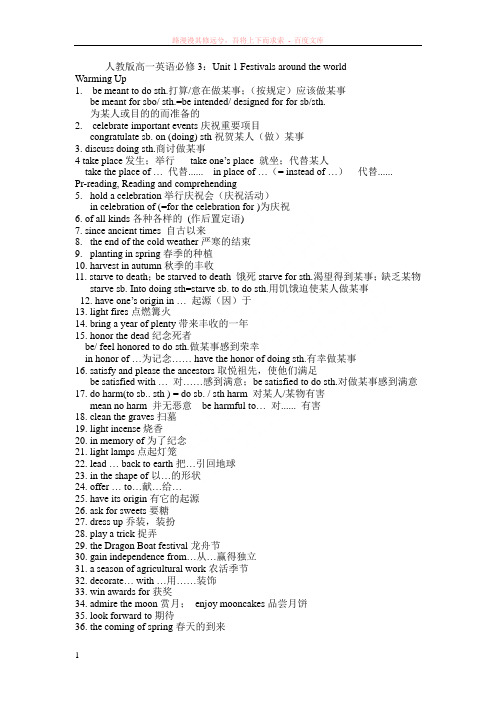
人教版高一英语必修3:Unit 1 Festivals around the worldWarming Up1.be meant to do sth.打算/意在做某事;(按规定)应该做某事be meant for sbo/ sth.=be intended/ designed for for sb/sth.为某人或目的的而准备的2.celebrate important events庆祝重要项目congratulate sb. on (doing) sth祝贺某人(做)某事3. discuss doing sth.商讨做某事4 take place发生;举行take on e’s place 就坐;代替某人take the place of …代替...... in place of …(= instead of …)代替......Pr-reading, Reading and comprehending5.hold a celebration举行庆祝会(庆祝活动)in celebration of (=for the celebration for )为庆祝6. of all kinds各种各样的(作后置定语)7. since ancient times 自古以来8.the end of the cold weather严寒的结束9.planting in spring春季的种植10.harvest in autumn秋季的丰收11. starve to death;be starved to death 饿死starve for sth.渴望得到某事;缺乏某物starve sb. Into doing sth=starve sb. to do sth.用饥饿迫使某人做某事12. have one’s origin in …起源(因)于13. light fires点燃篝火14. bring a year of plenty带来丰收的一年15. honor the dead纪念死者be/ feel honored to do sth.做某事感到荣幸in honor of …为记念…… have the honor of doing sth.有幸做某事16. satisfy and please the ancestors取悦祖先,使他们满足be satisfied with …对……感到满意;be satisfied to do sth.对做某事感到满意17. do harm(to sb.. sth ) = do sb. / sth harm 对某人/某物有害mean no harm 并无恶意be harmful to…对...... 有害18. clean the graves扫墓19. light incense烧香20. in memory of为了纪念21. light lamps点起灯笼22. lead … back to earth把…引回地球23. in the shape of以…的形状24. offer … to…献…给…25. have its origin有它的起源26. ask for sweets要糖27. dress up乔装,装扮28. play a trick捉弄29. the Dragon Boat festival龙舟节30. gain independence from…从…赢得独立31. a season of agricultural work农活季节32. decorate… with …用……装饰33. win awards for获奖34. admire the moon赏月;enjoy mooncakes品尝月饼35. look forward to期待36. the coming of spring春天的到来37.give children lucky money in red paper用红包装着压岁钱给小孩38. dragon dances舞龙灯39. the lunar New Year阴历新年40.day and night整天;日夜41.colorful clothing of all kinds各种艳丽的衣服42. Christian countries信奉基督教的国家43. be covered with被…罩着44. as though好像45.love to get together to eat, drink and have fun with each other喜欢聚在一起吃、喝、玩耍have fun with sb. =enjoy oneself / have a good time with sb.与某人一起玩得愉快46.enjoy life享受生活47. forget our daily work for a little while暂时忘记日常生活中的烦恼Learning about language and using langbuage48. have a good time with和…一起开心49. at the parking lot在停车场50. be heart-broken心都碎了51. at the coffee shop在咖啡馆里;after work下班后52. turn up出现53. right now立刻54. keep one’s word守信用55. hold one’s breath屏气56. drown one’s sadness in coffee用咖啡来解愁57. wipe the table擦好桌子58. visit the earth下凡来到人间;(be) on earth在人间59. the herd boy牛郎60. set off for home动身回家61. remind sb. of …因…想起某人62.pass the tea shop on the corner路过在转角处的茶馆63. wave at sb. 向某人招手Workbook64. wipe all one’s tears拭去泪水;hide the sadness on one’s face掩盖住脸上的悲伤65. dream about going back to one’s homeland 日夜梦想回到祖国66. win the beat actor at the Golden Rooster Award 荣获金鸡奖的最佳男演员67.be ready for a second try准备第二次尝试68.leave sb. alone让某人一个人呆会69. full-time workers全职工70.have free time有时间71 ask for permission请求许可72.have an eye examination参加一个视力检测73.sit in a café坐在咖啡厅里74.32 degrees below freezing零下32度75. pile… up along the sidewalks沿着人行道把…堆起来76. ride in horse carriage乘座马车77.admire the ice sculptures欣赏冰雕78. be dressed in heavy clothes穿了厚厚的衣服。
Unit1 Festivals around the worldTeaching aims:1. TopicFestivals; how festivals begin; how to celebrate festivals2. Useful words and expressions:Starve plenty satisfy ancestor lamp lead feast bone origin trick poet arrival national gain independence gather agricultural European custom award watermelon handsome rooster admire energetic forward Easter clothing religious social Christian daily permission possibility fool apologise drown sadness obvious wipe lovely couple weep announcer forgiveTake place in memory of dress up play a trick look forward to day and night as though have fun with turn up keep one’s word hold one’s breath 3. Functional items:1)RequestCould /Would you please…?Could I have…?Could we look at…?I look forward to ….May I see…?2)ThanksIt’s very kind of you…Thank you very much/thanks a lot.I’d love to.It was a pleasure….Don’t mention it.You are most welcome.4. Structures情态动词can, could, may, might, will, would, shall, should, must, can’t 等的用法。
Unit 1 Festivals around the world(新课标版高一英语必修三教案教学设计)Unit 1 Festivals around the worldThe First Period (Warming up & Pre-reading)Step One: Lead-inFree Talk: Did you have a good time in your winter holidays?When did you feel most happy and excited? Why?( At the Spring Festival. Because it's the most important festival in our country....)Step Two: Warming up1. Let the Ss think about the other Chinese festivals.( Lantern Festival, Pure Brightness Festival, Dragon Boat Festival, Mid-Autumn Festival, New Year's Day, Chung Yeung Festival....)2. Discussion One1)Let the Ss look at the information about Chinese festivals and discuss another four Chinese festivals according to the example in warming up: When does the festival come?What do people celebrate?What do people do?Festivals Date festivals DateNew Year January1st Teachers' Day September 10thInternational Women's Day March 8 National Day October 1stArbor Day March 12th The Spring Festival Lunar New Year International labor Day May 1st Dragon Boat Festival the fifth day of the fifth lunar monthInternational Children's Day June 1st Mid-Autumn Festivalthe 15th day of the 8th lunar monthArmy Day August 1st Lantern Festival the 15th day of the 1st lunar monthChinese Youth Day May 4th Pure Brightness Day April the fifth2) Let the Ss fill in the form in the warming up and ask some to share their opinions with the whole class.3 Discussion TwoTalk about some foreign festivals.( Christmas, April Fools Day, Easter Day, Halloween, Valentine's Day, Thanksgiving Day, Obon...)Step three: Pre-readingLet students think about the questions:1) What is your favourate holiday of the year? Why?2)What festivals or celebrations do you enjoy in your city or town? Do you like spending festivals with your family or with friends? What part of a festival do you like best- the music, the things to see, the visits or the food?Step Four: Language Points1.mean to do 打算做某事mean doing 意味着….I never meant him to work for us.Passing the entrance examination means being admitted into college.2. celebrate vt.(1) do sth to show that a day or an event is important 庆祝;祝贺celebrate Christmas / one’s birthday / a wedding anniversary / a victory(2) praise and honor 赞扬;称颂The names of many heroes are celebrated by the poets.词语辨析:celebrate, congratulatecelebrate后常接日期、事情或场合。
Unit 1Festivals around the worldPeriod 2Learning about language: Important language points整体设计教材分析This is the second teaching period of this unit. The teacher can first check students‟ homework and offer chances for students to review what they learned during the first period.The emphasis of this period will be placed on the important new words, expressions and sentence patterns in the parts Warming up, Pre-reading, Reading and Comprehending. In order to make students understand these important points thoroughly, we can first get students to understand their meanings in the context, then give some explanations about them, and later offer some practice to make students master their usages. Some new words and expressions, such as trick, gain, award, admire, take place, look forward to, as though and so on are very useful and important. So are the sentence patterns “. . . people would starve if food was difficult to find. ” and “The country, covered with cherry tree flowers, looks as though it is covered with pink snow. ” We ought to pay more attention to them and design special exercises.At the end of the class, the teacher can make students do more exercises for consolidation. In doing so, they can learn, grasp and use these important language points well.教学重点1. Enable students to grasp the usages of such important new words and expressions as trick, gain, award, admire, take place, look forward to, as though, etc.2. Get students to master the patterns “. . . people would starve if food was difficult to find. ” and “The country, covered with cherry tree flowers, looks as though it is covered with pink snow. ”教学难点1. Let students learn the usage of the expression “take place”.2. Enable students to learn the adverbial clause introduced by as though.3. Get students to understand some difficult and long sentences.三维目标知识目标1. Get students to learn and grasp the important useful new words and expressions in this part: beauty, harvest, starve, origin, religious, ancestor, Mexico, feast, bone, belief, poet, arrival, gain, independence, gather, agriculture, award, rooster, admire, energetic, Easter, clothing, Christian, custom, take place, in memory of, dress up, play a trick on, look forward to, day and night, as though, have fun with2. Let students learn the fo llowing important useful sentence patterns:1). . . people would starve if food was difficult to find. . . (the subjunctive mood)2)The country, covered with cherry tree flowers, looks as though it is covered with pink snow. (as though. . . )能力目标1. Get students to use some useful new words and expressions correctly.2. Enable students to make sentences after the useful sentence patterns.情感目标1. Stimulate students‟ interest in learning English.2. Develop students‟ spirit of cooperation and t eamwork.教学过程设计方案(一)→Step 1 Revision1. Check the homework exercises.2. Ask some students to talk about festivals and celebrations.→Step 2 Reading and findingGet students to rea d through Warming up, Pre-reading, Reading and Comprehending to underline all the new words and useful expressions or collocations in these parts.Read them aloud and copy them down in the exercise book after class.→Step 3 Practice for useful words and expressions1. Turn to Page 4. Go through the exercises in Discovering useful words and expressions with students and make sure they know what to do.2. Give them several minutes to finish the exercises. They first do them individually, then discuss and check them with their partner.3. Check the answers with the whole class and explain the problems they meet where necessary.→Step 4 Studying important language points1. Discuss when they take place, what they celebrate and what people do at that time.讨论它们(中国节日)是什么时间举行, 庆祝的是什么事件, 人们在当时做什么事。
take place: occur; happen 发生; 举行When does the ceremony take place? 仪式什么时间举行?We have never discovered what took place that night.我们从没发觉那天晚上发生了什么事情。
【辨析】take place, happen, occur, come about & break outtake place, happen, occur, come about和break out是同义词, 都含“发生”的意思。
英语中表示“发生”的词或短语均为不及物动词或短语, 不用于被动语态。
主语为所发生的事。
※take place侧重安排或按计划而发生的事, 带有“非偶然”的意思。
例如:The wedding will take place tomorrow. 婚礼明天举行。
In 1919, the May 4th Movement took place in China.1919年, 中国发生了五四运动。
※happen普通用词, 含义很广。
常指具体客观事物或情况的发生, 含有“偶然”的意味。
当以具体事物、事件作主语时, happen 和occur可以换用; 但当happen用作“碰巧”之意时, 不能用occur代替, 但可以与come about 互换。
例如:What has happened to her? 她出了什么事?It happened to rain that day. 那天碰巧下雨。